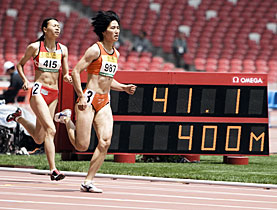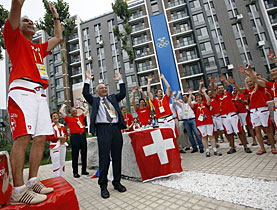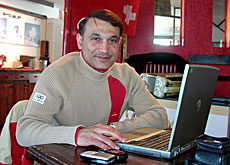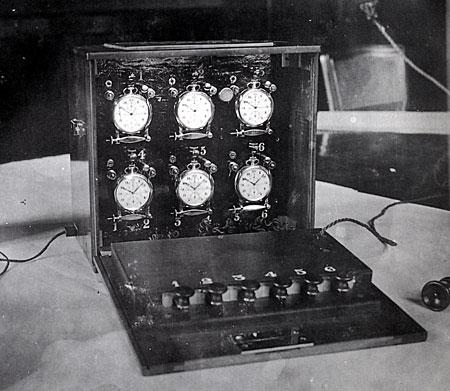Omega keeps up with the times at Olympics

Swiss watchmaker Omega has pulled out all the stops for its role as official timekeeper of the Olympic Games in Beijing.
There will be no shortage of state-of-the-art technology and back-up systems to make sure that the timing is right for the thousands of organisers and athletes as well as the millions watching on television.
Among the improvements from the previous Summer Games in Athens are high-speed cameras that can record 2,000 images per second, and new timing, scoring and false start systems.
Working behind the name Omega is Swiss Timing, a small company that is also a member of the Swatch Group.
It has transported 420 tonnes of equipment to the different Olympic locations and will have about 450 technicians and engineers as well as 1,000 trained volunteers on hand.
“Our role in Beijing is first of all to measure the performance of the athletes, provide results – rankings or scores – and then distribute them all,” the chief executive of Swiss Timing, Christophe Berthaud, told swissinfo.
That means to the competitors, judges and public at the stadiums on scoreboards, to commentators in print form, to news agencies, television networks, news agencies and the internet.
Computer power
“Of course, we use more and more computer power to give the results but also in terms of measurement of the performance… we have more precision and can follow much better what is going on,” he said.
For example in rowing the technology used is based on the Global Positioning System (GPS).
“It means we measure the position of each boat five times per second so we permanently know where the different competitors are on the lake,” Berthaud explained.
“Based on this, we can define the acceleration of the boat and the number of strokes per second. We can also measure the distance between the boats.”
Another innovation is an updated version of the Scan-O-Vision photo finish camera introduced in 1992 at the Winter Olympics in Albertville.
Pixels and precision
The latest generation records slightly more than 2,000 pictures per second and provides colour pictures, more and more pixels and increasing precision.
This allows the judges to have much better definition to tell accurately who is a race winner and who came second and third.
From a Swiss perspective many eyes will be on the marathon, in which Switzerland’s Viktor Röthlin – winner of the Tokyo marathon in 2008 – is taking part.
The race on August 24, the final day of competition, starts at Tiananmen Square in Beijing and finishes at the new “Bird’s Nest” national stadium designed by Swiss star architects Jacques Herzog and Pierre de Meuron.
Omega will be measuring the race every five kilometres and at the halfway stage, making nine intermediate points. At these it can give rankings and distances between some of the runners.
Electronic tag
“For this we have antennas on the road and then we have an electronic tag that’s on the lace of the shoes of the athletes,” Berthaud said.
“Each athlete has his own electronic identity and then with our computer system we are able to know all along the marathon exactly what is going on.”
In an Olympic first, Omega will also be providing virtual television services. In swimming, for example, you will be able to see the world record line so that you can tell if the swimmers are on the pace or not.
And you’ll also see the names of the athletes in their lanes as well as the flag of the country they represent.
It’s all a far cry from the 1932 Games in Los Angeles where Omega supplied 30 high-precision chronographs, all of which had been certified as chronometers by the Observatory at Neuchâtel.
It’s even worth noting that for the 1936 summer Games in Berlin, 185 chronographs were taken from Biel to the German capital in a suitcase carried by 29-year-old Omega watchmaker Paul-Louis Guignard. Those were the days when athletes dug their own starting holes with small shovels.
Pressure
While everyone understands the pressure on the participants of the Games, most will not appreciate what the official timekeeper has been doing behind the scenes to make sure everything works.
“We have had a team in Beijing since January 2005 supported by the staff in Switzerland. We have intensively prepared and tested all the different elements of the timekeeping, results and the distribution,” Berthaud said.
“Our people are professionals. They have a passion for sport and so we are very confident in what we will be able to deliver.”
swissinfo, Robert Brookes
Swiss Timing, which is part of the Swatch Group, was founded on July 3, 1972 but Swiss watch companies Omega and Longines had been involved in timing sport way before then.
Swiss Timing has regularly timed the Olympic Games: Innsbruck and Montreal in 1976, Lake Placid and Moscow in 1980, Sarajevo and Los Angeles in 1984, Calgary and Seoul in 1988, Albertville in 1992, Atlanta in 1996, Sydney in 2000, Athens in 2004 and Turin in 2006.
Apart from Beijing in 2008, the company will also be responsible for Vancouver in 2010 and London in 2012.
Swiss Timing says that to satisfy the requirements set out in the specifications, candidates have to invest enormous sums in new technology and maintain a team of highly qualified technicians.
The company is based at Corgémont and employs about 70 people.
Omega’s history of timekeeping at the Olympics goes back to Los Angeles in 1932. In Beijing it is responsible for official results at all competitions.
It will provide services that include the display of results to competitors and the public at the venues, data handling and the provision of venue results. It will also deliver official results for distribution by the print, broadcast and network media to audiences around the world.
The Beijing Olympic Games are Omega’s 23rd as official timekeeper.

In compliance with the JTI standards
More: SWI swissinfo.ch certified by the Journalism Trust Initiative



You can find an overview of ongoing debates with our journalists here . Please join us!
If you want to start a conversation about a topic raised in this article or want to report factual errors, email us at english@swissinfo.ch.